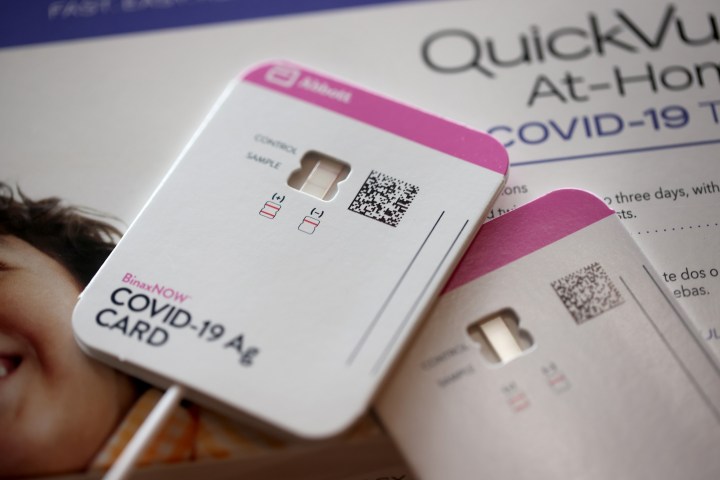
Potential hurdles ahead for Biden’s COVID-19 testing reimbursement plan
Share Now on:
Potential hurdles ahead for Biden’s COVID-19 testing reimbursement plan

President Joe Biden plans to require private insurers to reimburse as many as 150 million Americans who purchase over-the-counter, at-home rapid COVID tests.
At-home rapid COVID tests are costly, with a price tag of about $24 for a set of two. Jorge Caballero, a San Francisco doctor who co-founded Coders Against COVID, told Marketplace that these tests are too expensive for what they cost to produce.
The reimbursement model has raised concerns from those who think it’s more complicated than it needs to be. The Kaiser Family Foundation said that it could be “logistically cumbersome” for people to seek reimbursement every time they purchase a test if they regularly have to.
And many people do have to get tested: In the thick of the holiday season, COVID-19 is surging in several parts of the country. Nearly three dozen states showed higher seven-day averages last weekend compared to the period before Thanksgiving.
During a White House press briefing, a reporter told White House Press Secretary Jen Psaki that the plan sounded “complicated” and asked why the government wouldn’t just make the tests free.
“Then what happens if every American has one test?” Psaski asked. “How much does that cost, and then what happens after that?”
The country’s approach is markedly different to how other countries handle rapid testing. Your first 14 tests in the U.K. are free, for example, while Canada gives out free tests to businesses.
Sabrina Corlette, a research professor and co-director of Georgetown University’s Center on Health Insurance Reforms, said she thinks this plan is in place because the Biden administration is working within the framework of the insurance coverage system set up by Congress last year in its relief bill.
The bill passed last year required insurance companies to pay the price laboratories listed online, Corlette explained. One concern she has with the reimbursement model is that if they know consumers will be reimbursed, there is no incentive for manufacturers and retailers to bring down the price of tests.
“The incentive is actually to jack the price up,” Corlette said.
Another concern she has is that because it’s tied to a national public health emergency that expires every 90 days and must be continually renewed, there’s a time limit to the requirement for health plans to cover tests. The latest declaration expires in mid-January of next year.
“I suspect that the need for widespread testing will outlast the duration of the public health emergency,” Corlette said. “People should just be aware that this is a temporary policy.”
In an effort to help people who are uninsured and from underserved communities, the White House said it would also double to 50 million the number of free rapid tests it distributes to community sites and rural clinics.
Melinda J. Buntin, professor and chair of Vanderbilt University’s department of health policy, said that, ideally, at-home tests should be supplemented with targeted testing. If there was an outbreak in a certain region, Buntin said, she’d like to see public health officials mobilize and make rapid tests available in that area.
There’s a lot happening in the world. Through it all, Marketplace is here for you.
You rely on Marketplace to break down the world’s events and tell you how it affects you in a fact-based, approachable way. We rely on your financial support to keep making that possible.
Your donation today powers the independent journalism that you rely on. For just $5/month, you can help sustain Marketplace so we can keep reporting on the things that matter to you.


















